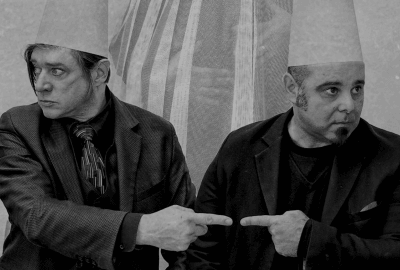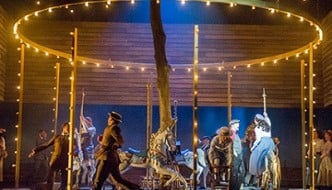Review: The Virtues of Things
May 24, 2015
[© 2015 ROH. Photographs by Stephen Cummiskey]
A keen opera-goer and amateur performer, I know my Mozart from my Puccini. Where the big classics are concerned, consider me there, dressed up to the nines, trying to keep the urge to sing along at bay. I’ve seen a few by Britten, but when it comes to contemporary operas, I am more or less a newcomer. So when the opportunity came up to see The Virtues of Things on the last night of its début two week tour, it was a chance to see something a little bit different.
And different it certainly was. The plot, in essence, was fairly straightforward. A crucial member of a prop-making family falls ill with a mysterious neurological disorder just as an important new commission has come in, so the young and somewhat radical Mr Eames is drafted in to help out. He takes it upon himself to shake up the status quo, suggesting the family modernise their heavily traditional approach to scenery. While the older characters, de Selby and Aunt Ellipsis, are unconvinced, Peg is enthused by the shift from the tangible to the suggestive, and plans are drawn up. The outraged Aunt Ellipsis is overcome by this, and suffers a similar breakdown to her sister. Doctor Gravid is called in, who declares the family to be afflicted with a genetic disorder based on the real-life Stendhal syndrome, where exposure to art, beauty and items of personal significance causes hallucinations and confusion. He orders that the family stay firmly in the realm of the banal while he prepares a mysterious elixir to slow the symptoms.
 >
>
[Fiona Kimm as Ellipsis de Selby]
Unfortunately for the de Selbys, art, beauty and items of personal significance are precisely what they deal in. As they discuss the designs and play with the props in the workshop, the family’s delirium spreads and grows, the music becomes more erratic and the text explodes. Mr Eames returns with the doctor and the elixir, but there is only enough for one, which he gives to Peg. He hopes a placebo will be enough for the others, but sadly this is not the case. Believing them protected, Peg is keen to try out the lighting display that Eames has created for the latest commission; in an instant, the small workshop becomes the whole universe, with all its connotations and meaning, and the excess of significance pushes the family over the edge. Ellipsis and de Selby believe themselves to be gods and descend into madness before dropping to the ground, dead. Eames makes a hasty getaway, and who can blame him.
Matt Roger’s complex score that underpins this surreal work is an undefinable exploration of genre. Alluding to classical opera, Sondheim and even computer game music, the music swoops and jerks in alignment with the plot, at times mirroring and at others contradicting Sally O’Reilly’s text. The Aurora orchestra, conducted by Richard Baker, spectacularly rose to the challenge of such a rich and unpredictable piece with gusto. The singers performed with a comparable energy, which they maintained with little opportunity for repose in the eighty-minute performance. I have a lot of respect for any singer that can learn music that is constantly shifting, particularly given that there were no discernible arias, rather the whole piece was more like a play with continual interchangeable dialogue. The text itself is a wonderful exploration of the power and malleability of language, and keeps humorous what could easily have become quite a dark piece. Words themselves take on characters and significance, adding yet another layer to the complex recipe of this short work.

[Paul Curievici as Eames]
The piece ended leaving me and my accompanying friends somewhat baffled. We all very much enjoyed it, but were not entirely sure what it was that we had just enjoyed. Hoping that the following Q&A session would provide some elucidation, we stayed behind for one of the talks, which give performances at the Howard Assembly Rooms an extra dimension. Nevertheless, it was certainly a memorable performance and one which I hope will be performed again to allow many others to be as amused and bemused as I was. While I don’t think I would be able to sing you a single line from the slightly rambling melodies (and I have to confess, I do prefer a musical performance that leaves me humming all the way home), it was certainly a memorable performance overall. I will never forget that I, too, am motorway.
Philippa Watts
For more on The Virtues of Things visit Opera North’s website




Comments